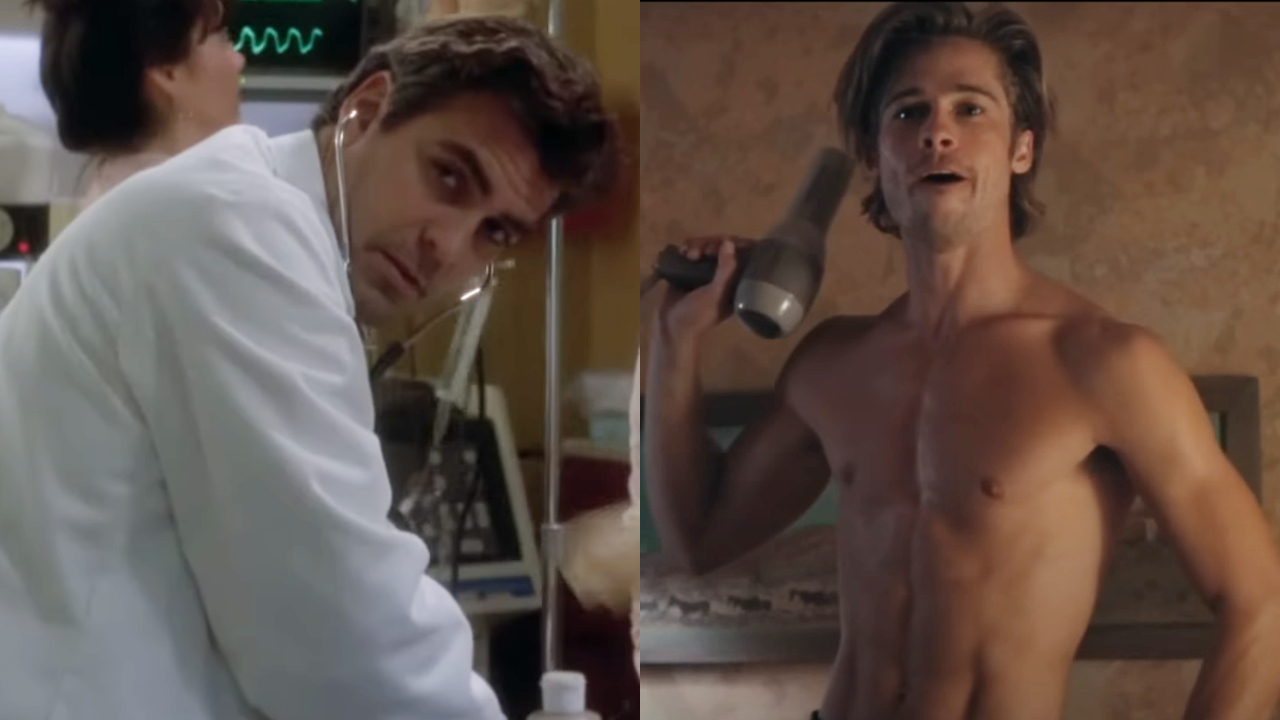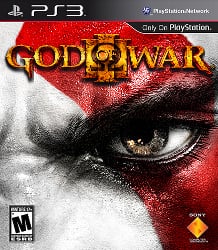
God of War III is by far the most hotly anticipated PS3 exclusive so far. It's not only the first next-gen GoW but also the end of a trilogy that began on the PS2 five years ago. Some might consider the game a bitter-sweet occasion but it's quite clear that Kratos' story has run its course.
The game begins with Kratos, the titular God of War, scaling Mount Olympus with the Titans in a bid to overthrow Zeus and the rest of the gods. The reason for this is established in God of War II and I'll briefly summarize: Zeus thinks Kratos wants to kill him so he tries to kill Kratos, therefore making Kratos want to kill him. GoWIII, then, is Kratos' quest for revenge. Come to think of it, that was GoWII's plot, too. For the second game in a row, Kratos is motivated solely by his lust for murdering Zeus. The blueprint for the plot is as follows:
Kratos: ZEUUUUUSSSS!
Popular character from Greek mythology: You'll never kill Zeus, Ghost of Sparta!
[Kratos kills them and takes their weapon]
Kratos: ZEUUUUUSSSS!
This pattern is repeated for about six hours. I've got no problem with killing the likes of Hades and Poseidon - those larger-than-life encounters are what makes the series so fun - but the story's just spinning its wheels for the first two-thirds of the game. Zeus barely shows his face during this period of time, so the player never really shares Kratos' lust for revenge. We don't simply don't know his target well enough. You could argue that Zeus antagonizing Kratos by proxy (sending his minions to fight him) but many of the foes you encounter have no allegiance to him.
Your Daily Blend of Entertainment News
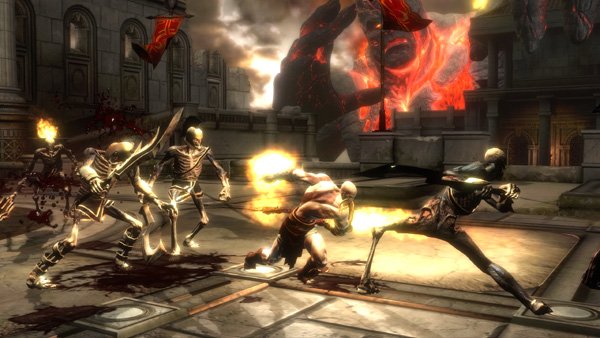
In the last act of the game, the developers remembered that this is the end of a trilogy so they try to force an emotional change on Kratos. There's nothing wrong with character development but it's not something you can just cram into the last couple hours after a long period of neglect. There's not enough time or space for Kratos' transition to really feel believable. If you're going to change him from a murderous, selfish prick into, well, something very different, that takes time. The game instead just opts for a shotgun blast of feel-good nonsense. It's not a fitting end to a single game, much less a five-year series.
Fortunately, God of War's appeal was never really about the storyline. Instead, it's rooted in the simple thrill of being the biggest swinging dick in Greek mythology. With the story arc coming to a close, the game throws as many big name enemies at you as possible. Previous GoW installments had you fight one god per game but here you're battling one after the other. The gods of Olympus are the ones keeping the world in order so killing them obviously causes some problems. With every god you kill, the world falls further into ruin. For example, the world falls dark and rains constantly when Helios dies. It's these visuals that remind you of how important your actions are and how powerful Kratos really is. The boss fights really have weight, even if the overall story isn't so great.
The game's visuals help maintain that epic feel. I know you've probably seen the word "epic" in every preview and review you've ever read about this game and it's lost all its impact by now. However, it really does fit here. Kratos' adventures on the PS2 and PSP were both incredible-looking and the PS3's enhanced capabilities bring the visuals to a whole new level. The title screen shows an almost life-life close-up of Kratos' scarred, bloodied face. Impressive for menu art, yes, but once you start up the game, you'll realize that that's exactly how he looks in the game too. You won't have too much time to admire his features, though, as the game's camera is often pulled way out. The game employs these wide shots to show off the massive set pieces that make up the world: an enormous gate framed with giant stone statues, a walkway suspended over the Underworld, etc. In the beginning of the game, you're actually fighting on the back of a Titan.
The combat is about the same as it was in previous installments with a couple new wrinkles. You string together attack combos with the Square and Triangle face buttons and can grapple smaller opponents with Circle to deliver an instant killing blow. When opponents are near death, a Circle button prompt appears above their head and you can attempt an gory execution (performed by completing a Quick Time Event). What's different is how you're able to use opponents against each other in combat. Instead of simply snuffing out a grappled underling, Kratos can now hold them like a battering ram and charge through packs of enemies. The Quick Time executions, meanwhile, give you certain bonuses depending on the enemy you're killing. Slaying a Gorgon, for example, will turn nearby enemies to stone. "Saving" these special enemies - i.e. keeping them at bay and not accidentally killing them - until their execution bonuses are needed becomes key to surviving the lengthier fights.
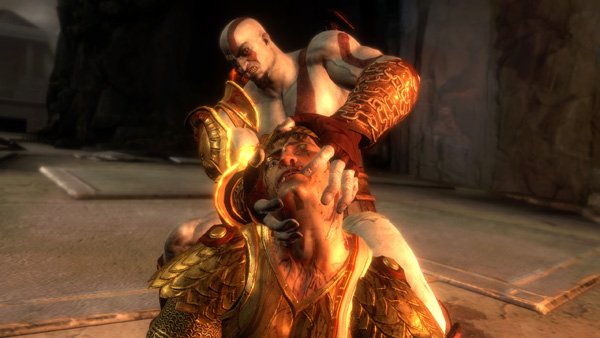
The new weapons and spells are a bit of a letdown. It seems like the developers identified what attacks the players used most in the previous games and made all of the weapons/spells in GoWIII fit into those narrow categories. There are four primary weapons that you can switch between. The Blades of Exile are a pair of swords on chains and are the equivalent of the Blades of Chaos or Blades of Athena from previous games. No complaints about that - they're Kratos' signature weapon. However, two other primary weapons you acquire (Nemesis Whip and the Chains of Hades) are almost exactly the same. The fourth weapon are the Gauntlets of Cestus, which are almost identical to the Gauntlet of Zeus from God of War: Chains of Olympus.
I'll admit that I used the Blades of Chaos for 90% of the time in GoWII and barely touched the Barbarian Hammer or Spear of Destiny. That's probably what most people did. However, making every weapon exactly like the Blades of Chaos seems like the wrong answer to this design problem. The weapon selection should ideally add some variety and strategic choice to the game and that doesn't happen here. Even the spells and secondary weapons feel familiar. Three of the four spells in the game are simply area of effect attacks - what's the point of using one and not the other? Also, did we really need another bow and arrow? If you've played any other game in the series, there's very little to learn about GoWIII's combat.
GOWIII ditches the flying combat from its predecessor. GOWII had a few arcade-like segments in which Kratos rode on Pegasus' back and smacked enemies who got too close. This is replaced with a few sequences of Kratos flying through tunnels with the Icarus wings on his back. The object is to avoid any beams or debris in your way. It's simple but fun; it looks great and it's done sparingly enough to stay fresh. The flight may have been even better if it were integrated better into the rest of the game, though. Instead of just having one long flying sequence, why not insert shorter flights into boss fights or other combat? Just a thought. As is, it's tough to shake the feeling that you're playing a minigame.
About a fifth of the game is comprised of puzzles. In past games there were a bit too many puzzles solved by putting dead bodies or statues on pressure plates to open doors. That happens a bit here but on the whole there's much more diversity. There's even a Guitar Hero style challenge at one point. The game gooses you along an appropriate amount through these sequences; you can tell that you just accomplished a piece of the puzzle by the spawning of enemies or the camera panning to show you where to head next. If you only care about the action, you'll get back to it quickly enough.
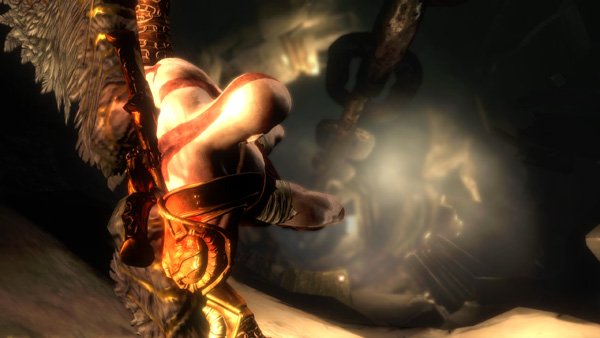
The campaign will take you around nine hours to complete. However, there's a bunch of content waiting for you after you beat the game. You'll unlock a stockpile of behind-the-scenes videos as well as a series of standalone challenges that test your combat skills in interesting ways. One challenge, for example, asks you to kill a mob of enemies without using any weapons. Why didn't they ever try to work these sorts of situations into the game itself? Once you've completed all the challenges, you gain access to a combat arena to let you test out Kratos' skills. Bit weird to give you a training arena after you're already a seasoned veteran of the game but whatever. It allows you to prepare for the Chaos difficulty, playable after you've beaten the game once.
This review might strike you as highly negative and completely out of sync with the review score. The thing is, so many of the positive aspects of the game (the hectic combat, the excellent art design, etc.) go unsaid in this review because, well, they're the same things that made every chapter in this series great. It's tough to conjure up fresh enthusiasm for features that are five years old. The gameplay still holds up but at this point it feels a bit commonplace. The score of GoW imitators on the market don't help matters. Jumping on an cyclops' back and steering him into his allies just seems a lot less special when you can do the exact same thing in Darksiders or similar fare. As the game's strong points fade into the background, the flaws become a lot easier to spot.
GoWIII is pretty much everything you'd expect from this series and nothing more. It's tough to fault the game for being a "standard God of War game" when you consider how high that standard really is. However, the improvements in design between GoWII and GoWIII aren't nearly as significant as the technical advancements. Perhaps that will change in the next game, though, as the series leaves Kratos behind. He hasn't changed with the times and Sony needs to find a new muse.
Players: 1 Player
Platform(s): PS3
Developer: SCEA Santa Monica
Publisher: Sony Computer Entertainment
ESRB: Mature
Rating:

Staff Writer at CinemaBlend.

